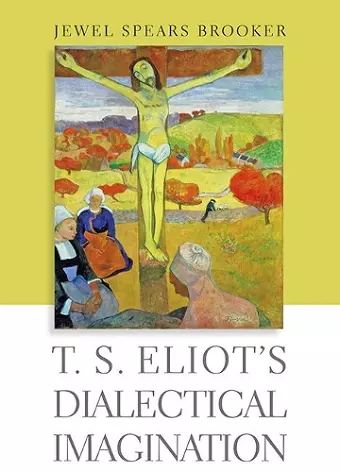T. S. Eliot's Dialectical Imagination
Format:Hardback
Publisher:Johns Hopkins University Press
Published:7th Dec '18
Currently unavailable, and unfortunately no date known when it will be back

What principles connect—and what distinctions separate—“The Love Song of J. Alfred Prufrock,” The Waste Land, and Four Quartets?
The thought-tormented characters in T. S. Eliot’s early poetry are paralyzed by the gap between mind and body, thought and action. The need to address this impasse is part of what drew Eliot to philosophy, and the failure of philosophy to appease his disquiet is the reason he gave for abandoning it. In T. S. Eliot’s Dialectical Imagination, Jewel Spears Brooker argues that two of the principles that Eliot absorbed as a PhD student at Harvard and Oxford were to become permanent features of his mind, grounding his lifelong quest for wholeness and underpinning most of his subsequent poetry.
The first principle is that contradictions are best understood dialectically, by moving to perspectives that both include and transcend them. The second is that all truths exist in relation to other truths. Together or in tandem, these two principles—dialectic and relativism—constitute the basis of a continual reshaping of Eliot’s imagination. The dialectic serves as a kinetic principle, undergirding his impulse to move forward by looping back, and the relativism supports his ingrained ambivalence.
Brooker considers Eliot’s poetry in three blocks, each represented by a signature masterpiece: “The Love Song of J. Alfred Prufrock,” The Waste Land, and Four Quartets. She correlates these works with stages in the poet’s intellectual and spiritual life: disjunction, ambivalence, and transcendence. Using a methodology that is both inductive—moving from texts to theories—and comparative—juxtaposing the evolution of Eliot’s mind as reflected in his philosophical prose and the evolution of style as seen in his poetry—Brooker integrates cultural and biographical contexts. The first book to read Eliot’s poems alongside all of his prose and letters, T. S. Eliot’s Dialectical Imagination will revise received readings of his mind and art, as well as of literary modernism.
Brooker's familiarity with the detailed chronology of Eliot's intellectual development makes her an exceptionally helpful and authoritative guide . . . this is a lucid, intricate but informative book, and the more you already know about Eliot, the more you will learn from it.
—Review of English Studies
Brooker integrates complex philosophical and theological analyses into a deeply sympathetic, emotionally intelligent study. She excels in guiding us along Eliot's intellectual and creative trajectory, using dialectics to draw a portrait of the conflicted mind of a poet who 'abandons nothing en route' . . . T. S. Eliot's Dialectical Imagination will no doubt become a standard point of reference in the Eliotic critical canon.
—The Modernist Review
Brooker's work makes skillful use of hitherto unpublished materials.
—Make it New: The Ezra Pound Society Magazine
Jewel Spears Brooker has written a book fully deserving of those accolades on its dust jacket. Its originality, intellectual heft, and clear, graceful style make it appealing to Eliot's general readership and essential for Eliot scholars. "We are in the dawn of a renaissance in Eliot studies," she writes in her Introduction. T. S. Eliot's Dialectical Imagination is a distinguished contribution to that renaissance, taking it beyond its dawn to full sunrise.
—Victor Strandberg, Literary Matters
In eleven compact and cogent chapters, Jewel Spears Brooker provides a persuasive account of T. S. Eliot's development as man, thinker, and poet. Brooker's book . . . is likely to be permanently useful.
—Massimo Bacigalupo, Modern Language Review
T. S. Eliot's Dialectical Imagination is an important contribution to Eliot criticism that will undoubtedly become essential reading for scholars of modernism in general and of T. S. Eliot in particular. Its straightforward and lucid language, accessible structure, and expert use of recent scholarship will appeal to a general Eliot readership as well. Like Brooker's other books and essays, T. S. Eliot's Dialectical Imagination is a major achievement.
—Kinereth Meyer, Partial Answers
Brooker's latest monograph, T. S. Eliot's Dialectical Imagination, is a hallmark of scholarly brilliance and literary taste.
—Lizi Dzagnidze, Journal of Literary Theory and Comparative Literature
T.S. Eliot's Dialectical Imagination provides a fresh and systematic Eliot, reassesses some fundamental issues in Eliot studies, and more importantly, opens up new areas of interpretation regarding Eliot's concern with wholeness, his attitudes toward science and scientific methods, and his ventures into mysticism and epistemology.
—Chen Lin, Shanghai Normal University, Journal of Modern Literature
ISBN: 9781421426525
Dimensions: 229mm x 152mm x 19mm
Weight: 476g
240 pages